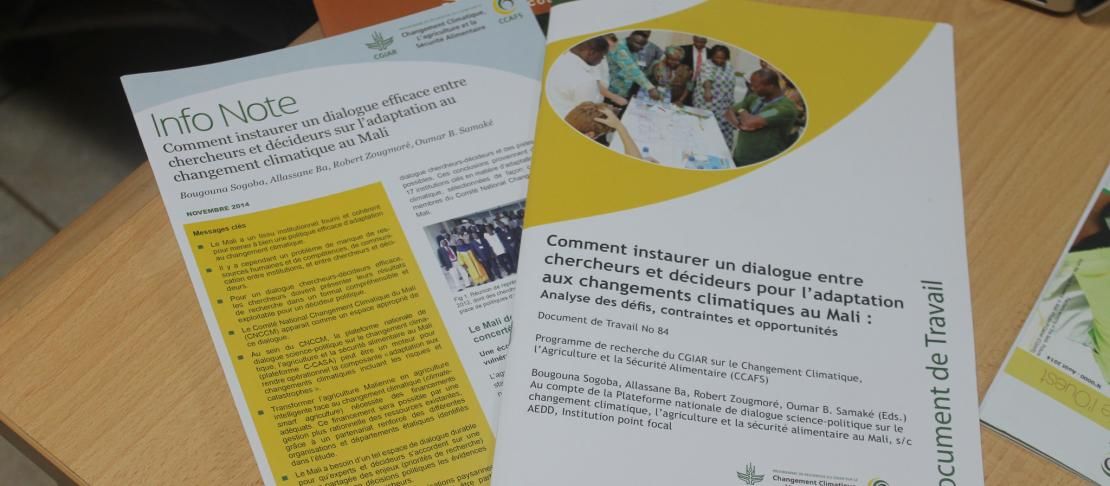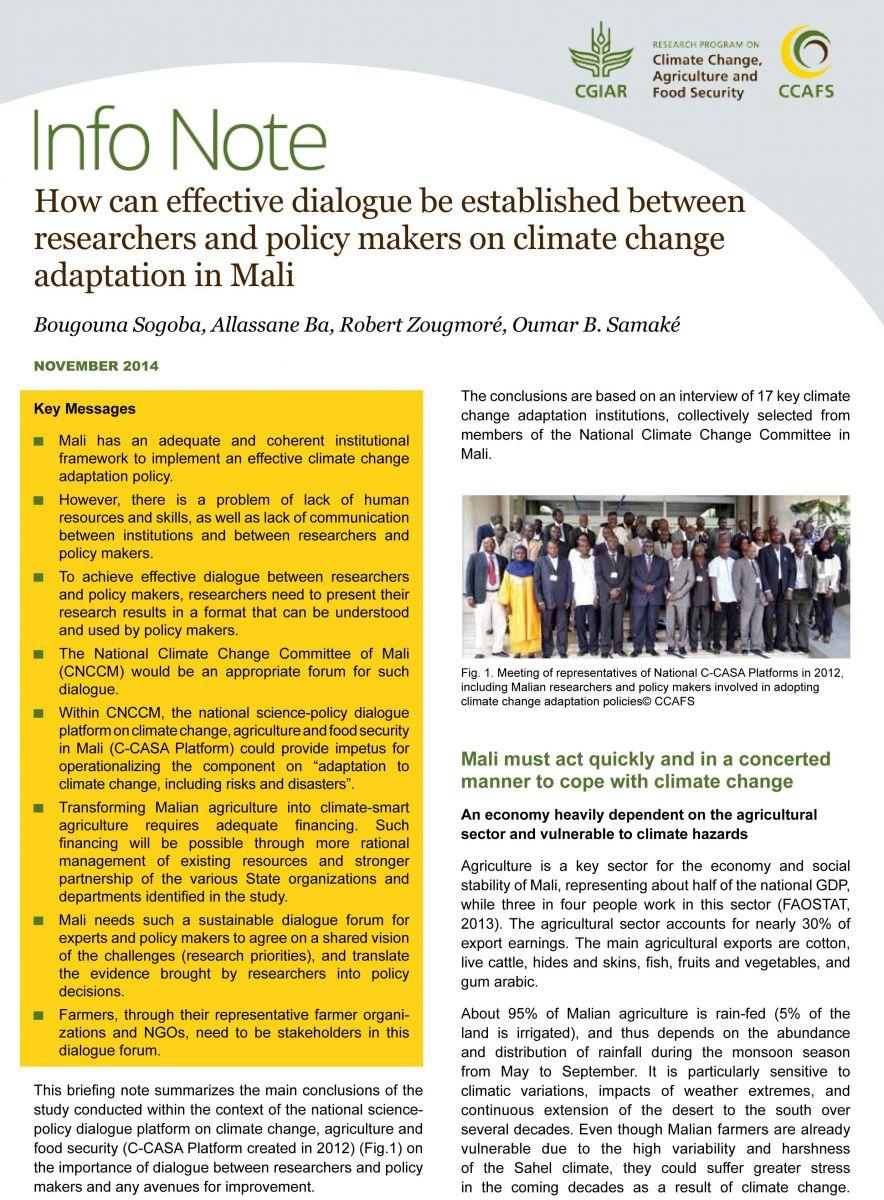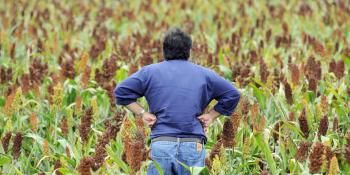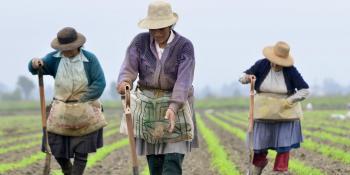Keys to an effective dialogue between researchers and policymakers in Mali

Mali needs a sustainable dialogue forum for experts and policymakers to agree on a shared vision of research priorities and translate findings from researchers into policy decisions.
An information note summarizing the main findings of Working Paper No. 84 
entitled: How can effective dialogue be established between researchers and policy makers on climate change adaptation in Mali was published recently.
A conducive situation
This study underscores the importance of dialogue between researchers and policymakers, and suggests possible avenues for improvement.
According to the information note, a mapping and analysis of the missions of State actors and civil society organizations involved in the management of climate change in Mali show that there is a satisfactory institutional network required for each sector activity to be supported towards more sustainable development. No less than twenty organizations have been identified as vital for issues relating to adaptation of the agricultural sector to climate change.
The Government of Mali has been mainstreaming climate change for a long time, with in particular a National Action Plan for Climate Change Adaptation.
Nevertheless, the issues and vulnerability depend on the socio-economic sectors, regions and groups of people.
Sector management of adaptation and mitigation issues are therefore required for agriculture and food security, as well as inter-sector collaboration with water, energy, health and other sectors concerned with the issue.
Difficulties in implementation
Implementation of the recommendations of the main findings of the study, conducted under the national science-policy dialogue platform on climate change, agriculture and food security encounters problems at several levels.
The first problem arises with respect to the operation and capacity of institutions. Indeed, most institutions lack adequate qualified human resources to understand all the issues, develop appropriate responses, and cover the country in a satisfactory manner. They fail to adequately own their missions because of limited skills, as well as lack of formalized communication between institutions to look for synergies and share existing knowledge.
The second problem is that funding for the definition of priorities and the role of national coordination are often underlying issues; for example, the weak leadership of the National Scientific and Technological Research Center in directing a climate change research policy, as the center has limited influence on bilateral funding from major research institutes, such as the Institute of Rural Economy (IER).
Finally, there are difficulties in communication/interaction between policymakers and researchers due to different perspectives. While politicians want certainty and impact with figures, the scientists talk about a variety of possible future trends.
Dialogue is difficult because scientific information is not adequately popularized, consolidated or disseminated. This could explain why politicians do not consider scientists as indispensable partners.
Moving effectively from scientific data to political action
The challenge is to create a forum for sustainable and formal dialogue where researchers and policymakers can meet regularly to define a shared vision, as well as take concrete policy decisions based on scientific evidence. This will entail training policymakers to understand all dimensions of climate change.
Researchers will work to produce useful research findings for policy debate, impact assessment, as well as costs and benefits of an adaptation solution.
Institutions such as the National Climate Change Committee of Mali (CNCCM) and the Environment and Sustainable Development Agency (AEDD) can play a key role in such enhanced cooperation between researchers and policymakers.
Land problems between graziers, fishermen and farmers should also be taken into account when preparing research programs. It is necessary to include farmer organizations and non-governmental organizations dedicated to sustainability development in this dialogue forum for climate change adaptation because they can draw attention to grassroots concerns.
Communication at the core of the problem
Many policymakers do not have wide knowledge of issues relating to agricultural adaptation to climate change. On the other hand, researchers do not provide research findings that can be easily transformed into pragmatic actions. Scientific information is not adequately popularized, consolidated or disseminated. This could explain why policymakers do not consider the presence of researchers as indispensable and as a useful source of information for formulating a policy and a development plan against climate change.
Formalized forums for dialogue between researchers and policymakers are rare or non-existent: for example, since its creation in 2002, the High Local Authorities Council, which is a key driver of decentralization, has only rarely invited IER researchers.
Scientific research in climate change should be presented in good style and format to be understood by non-experts, and lead to concrete and immediate policy action. For example, researchers could help DNA to become or once more become a source of proposals and information on the impact of climate change for the weekly meeting of the Minister of Agriculture and close collaborators. This could, for example, be an assessment study on the shortfalls due to lack of access by farmers to drought-tolerant crops. This could influence the formulation of project ideas, or at least the implementation of innovative projects, as well as the upscaling of conclusive findings.
This effort to disseminate and communicate challenges and solutions to the largest number of people is essential for ensuring that climate change issues are taken seriously in policy debate. The CCAFS Platform and the network of journalists on climate change need to help in this respect. This is vital for Mali, which is one of the countries most vulnerable to climate change.
DOWNLOAD THE INFO NOTE HERE
Read more: New knowledge sharing platform helps Mali rig better defense against climate change
Sékou Touré is the communication officer of CCAFS West Africa.
Robert Zougmoré is the Regional Program Leader of CCAFS West Africa.



